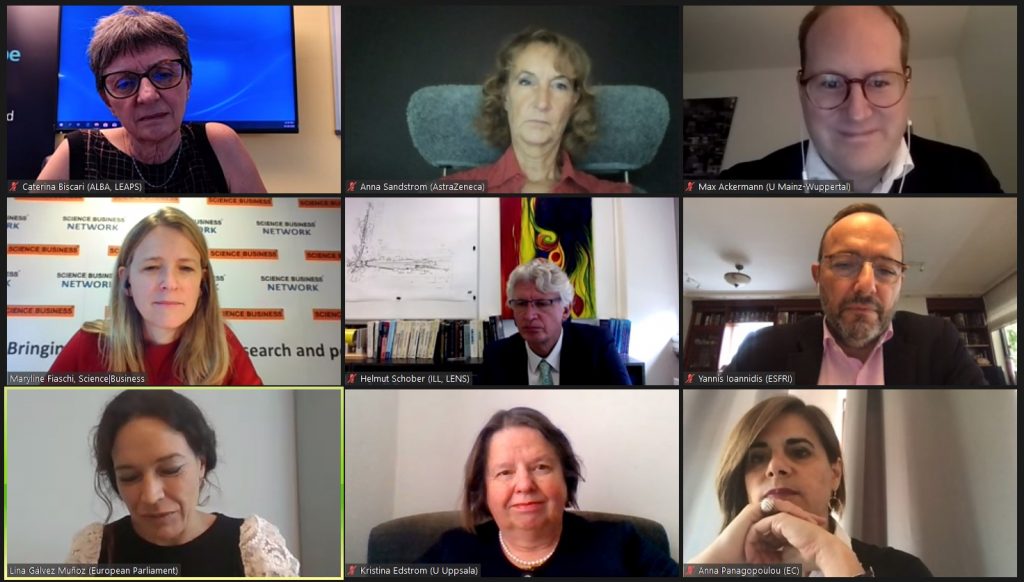ALBA Synchrotron

LEAPS invited to a Zoom webinar on 28 October 2020, 10–12 CET "European Research Infrastructures: Engines for Science and Innovation" hosted by MEP and vice-chair of the ITRE Committee at the European Parliament, Lina Gálvez.

Cerdanyola del Vallès, 19th November 2020
As the consortium of every Synchrotron radiation and Free-Electron Laser facility in Europe, LEAPS aims at contributing to shaping the Research Infrastructure (RI) landscape in Europe by inviting every Member State and join forces to assure the RI under Horizon Europe. At this event, the key role of RIs was showcased in contributing to solve the most urgent Global Challenges, including energy storage and viral threats.
A lively debate took place with right-to-the-point interventions from the European Commission, the LEAPS chair (ALBA's director Caterina Biscari), scientific experts K. Edström on the topic energy materials and M. Ackerman on viral and microbial threats and industry expert A. Sandström from AstraZeneca, Europe. This was followed by a panel discussion of experts and finished with an open discussion in the form of interactive exchange of experts and policymakers.
- "The negotiation at the European Parliament to increase the budget will be difficult because national interests are too strong in science. However, especially for RIs, there is a very clear need for international programs and cooperation." Lina Gálvez, vice-chair ITRE Committee, European Parliament
- "The European Commission has recognized the role of RIs over the years by funding RIs and access of researchers to RIs. Now is the moment where we should have a more strategic approach in collaboration with various stakeholders for RIs to identify those areas where the role of RIs would be further recognized". Anna Panagopoulou, DG R&I RTD, European Commission
- "It was amazing how quickly RIs in lock-down situation reacted to the pandemic and came-up with a quick-access program focused on COVID-19, pushing the scientific community to also react. LEAPS facilities have been at the fore-front there." Yannis Ionnidis, ESFRI
World-class RIs allow researchers to boost their careers and achieve more impactful results with their use. In fact, RIs are the success story of the European Research Area (ERA). The continuous evolution of RIs and the innovations developed at their heart provide a competitive advantage for research organizations, industry and the whole continent. RIs deserve proper funding and support at European level from Horizon Europe. Especially, due to the growing need to make national RIs more accessible to researchers from other Member States and in order to enable cost-efficient coordination in the renewed ERA.
RI substantively contribute to the objectives of the green deal by enabling research for clean, reliable and affordable energy and sustainable transport and elicits finding molecular targets to fight the pandemic caused by SARS-CoV-2. The event gave a glimpse of a working landscape for RIs, in which not only the Member States but also the facilities themselves have a more prominent role. This model can work together with the funding instruments in Horizon Europe for the benefit of researchers and innovators all across Europe.
- "It was very positive to see that the different European institutions are aware of LEAPS difficulties to fully develop our program but that our objectives are aligned and that we can work together to create the world´s most advanced science consortium." Caterina Biscari, Chair LEAPS and ALBA Synchrotron Director.